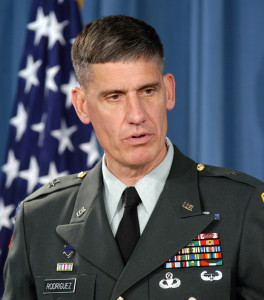
A quick survey of today’s military leaders suggests the answer is yes. Defense Secretary Chuck Hagel has picked up where his predecessors left off, highlighting the importance America’s use of all its tools of national power to achieve its goals. According to Hagel, “America’s role in the world should reflect the hope and promise of our country, and possibilities for all mankind, tempered with a wisdom that has been the hallmark of our national character. That means pursuing a principled and engaged realism that employs diplomatic, economic, and security tools as well as our values to advance our security and our prosperity.” The past decade of war has shown that America’s global engagement needs a comprehensive approach to improving the lives of many in countries around the world, using diplomatic, economic, and security tools.
The military’s Combatant Commanders have often shown their appreciation for the value of civilian power.  The new commander of U.S. Africa Command, Army General David Rodriguez recently spoke about Africom’s supporting role working with civilian agencies in his theater of operations. “We conduct all of our military activities in close coordination with our African partners and our partners in the U.S. Government,” Rodriguez said. “Every team has a leader. And in the countries where we operate, that leader is the U.S. ambassador.”
The new commander of U.S. Africa Command, Army General David Rodriguez recently spoke about Africom’s supporting role working with civilian agencies in his theater of operations. “We conduct all of our military activities in close coordination with our African partners and our partners in the U.S. Government,” Rodriguez said. “Every team has a leader. And in the countries where we operate, that leader is the U.S. ambassador.”
Development has been viewed as a key function of Africom since its creation in 2008. Rodriguez’s two predecessors, Lt. General Kip Ward, USA (Ret.) and General Carter Ham, USA (Ret.), were strong voices about the importance of civilian capacity. Plus, Africom has a vital role to play in supporting initiatives like Feed the Future and the President’s Emergency Plan for AIDS Relief (PEPFAR). In the past, Africom has characterized PEPFAR as an essential component of overall U.S. strategy for the region. And while these issues were important to the Combatant Commanders on active duty, their advocacy didn’t once they moved to the private sector.
Further, the recently announced new co-chairs of USGLC’s National Security Advisory Council, Admiral James Stavridis, USN (Ret.) and General Anthony Zinni, USMC (Ret.) – both former Combatant Commanders themselves – argued that civilians were the “key to real victory” in conflicts. According to Stavridis and Zinni, “American troops can fight wars, but they cannot address the problems that most likely led to the conflict in the first place like failed governments, structural economic problems, and extreme poverty.” Their voices echo those from last summer, when a panel of former and current Combatant Commanders spoke eloquently about the vital role civilians played during their tenures in the field.
An understanding of the importance of civilian-military cooperation has been perhaps even more powerful for those with boots on the ground – that is, the enlisted soldiers and other service members who saw the need for “smart power” in Afghanistan and Iraq. Marine veteran Peter Dixon and Army veteran Wayne Culbreth have firsthand knowledge of the positive impact of “smart power” in conflict zones and advancing U.S. strategy through their service. And then you have veterans like Robert Feldman, who was also a U.S. Peace Corps volunteer, arguing how the Peace Corps contributes to U.S. national security and “might even be the best security bargain in the entire budget.”
While diplomats and development professionals take the lead for the U.S. in providing relief for those in need in the developing world, the military continues to play a significant supporting role. Not only does our military advocate for more civilian power through the International Affairs Budget, but they provide logistical support to civilians as we have seen recently with U.S. Pacific Command supporting USAID in the Philippines. As we take stock of the last decade of conflict, the voices of the military show that the lessons learned on the vital role of “smart power” will endure even as the nature of conflict changes.